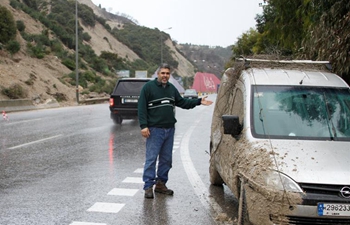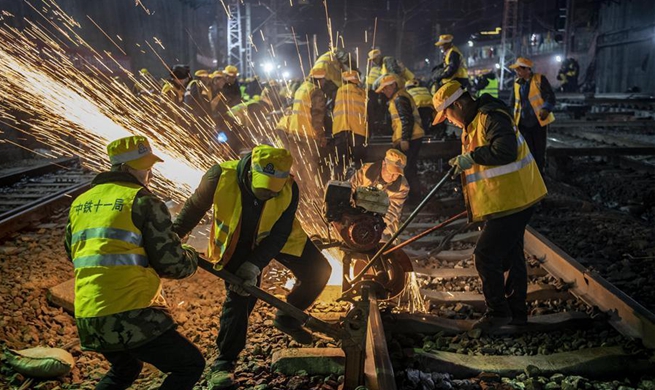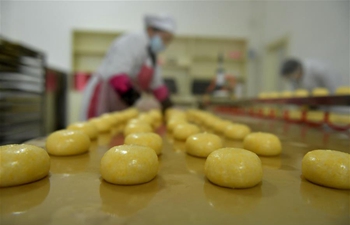ROME, Jan. 15 (Xinhua) -- Italian pundits analyzed late Tuesday the implications and possible outcomes for Brexit after British MPs overwhelmingly rejected the deal Prime Minister Theresa May negotiated with the European Union (EU) by 432 votes to 202, prompting opposition calls for a no-confidence vote and a new referendum.
The deal May negotiated in November 2018 calls for the UK to withdraw from the EU on March 29.
"For the past couple of years there's been a continuous and very insistent narrative on the need for change, no matter what kind of change it is," commented journalist Marianna Aprile, who writes for Oggi (Today) weekly magazine, on Otto e Mezzo (Eight and a Half) talk show on La7 private broadcaster.
"(Tonight's vote) is the proof that change for its own sake is not enough, but rather it must be part of an idea of the future and of a country, whether alone or in company, whether many or few, but it must be a clear and sustainable idea, not a mere wish list," Aprile opined.
On the same show, writer and Il Foglio newspaper journalist Pietrangelo Buttafuoco said a new referendum on Brexit would be "unthinkable". British citizens in 2016 voted 52-48 percent in favor of leaving the EU.
"We'll see," Corriere della Sera newspaper editorialist Beppe Severgnini replied with regards to a possible second referendum on Brexit.
"The issue is that (the British) voted based on a series of promises and lies," Severgnini said. "It is not a given that the 'Leave' vote would win again. If the UK leaves without a deal on March 29, the most optimistic forecasts see British gross domestic product (GDP) collapsing by 8 percent -- it would be an enormous problem for them."
Such an outcome would have serious economic fallout for Italy's fragile economy as well, Severgnini added.
"If UK GDP plunged 8 percent, we wouldn't be able to ignore it," he said. "It would be a huge shock coming from the Northwest, and we would all feel it."
Both Aprile and Severgnini pointed out that there are 650,000 Italians living in the UK as well as 60,000 Britons living in Italy, most of whom voted "Remain" in 2016.
Writing on Sole 24 Ore business and financial newspaper, analyst Angela Manganaro commented that one of the possibilities now is for the UK to simply postpone Brexit for a few months by "extending Article 50 of the EU Treaty, which the UK invoked to start its withdrawal procedure".
"Simply put, the British government -- whether May stays or resigns -- would have a couple of extra months to come up with a text that could win approval by parliament," Manganaro wrote.
A second referendum is also a possibility, and in that case "the Remainers would have a chance at winning" if aging Brexiters die, "because in 2016, the older generations were the ones who angrily voted against the EU while the young voted Remain: the latter have time on their side," the Sole 24 Ore journalist wrote.
In a brief report issued shortly after the vote, the Italian Institute for International Political Studies (ISPI) wrote that the UK now has four options: negotiating a so-called "Plan B" Brexit deal with the EU; May could submit to parliament a new so-called "soft Brexit" deal, with the UK remaining in the single market; a so-called "hard Brexit", in which the UK would leave the Union without negotiating terms with the EU, meaning that trade barriers would immediately go up; and lastly, a unilateral withdrawal from the Brexit procedure.
A hard Brexit would cause the UK economy to contract by "up to 8 percentage points" and reduce per-capita GDP by 3,000 euros (about 3,423 U.S. dollars) in the first year, according to ISPI, due in part to the fact that trade with the EU accounts for half of its overall trade. Such a scenario would also be bad for Italy, which has a 12-billion-euro (about 13.7 billion dollars) yearly trade surplus with the UK, ISPI wrote.













